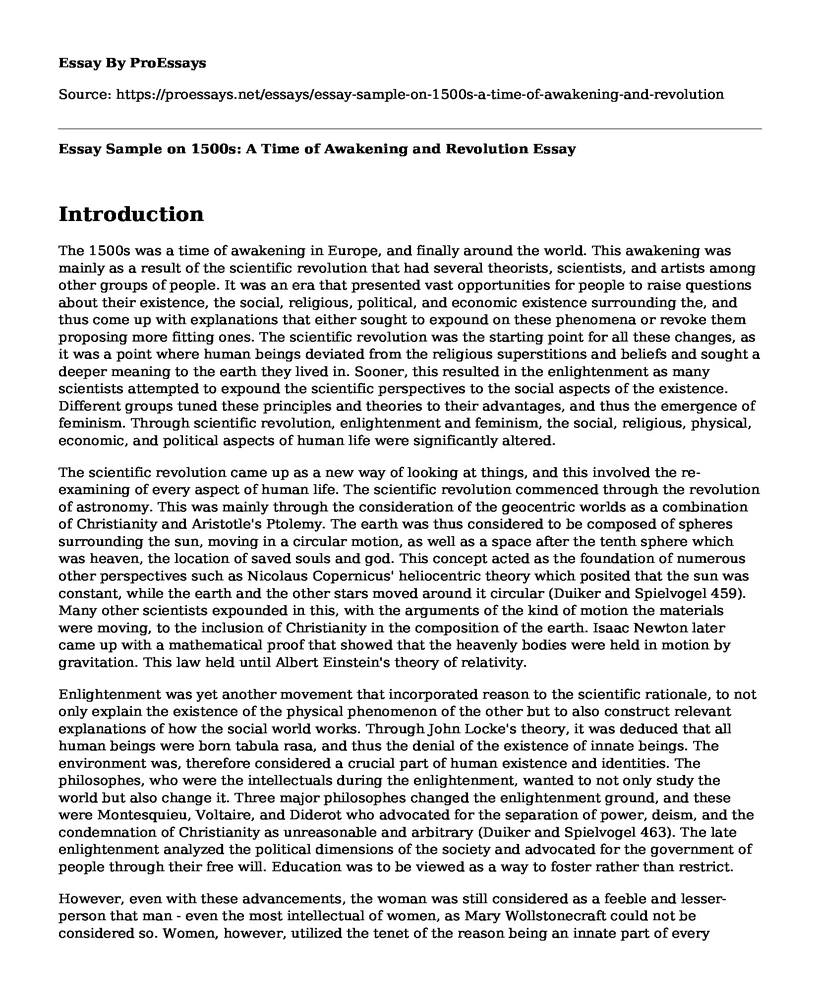Introduction
The 1500s was a time of awakening in Europe, and finally around the world. This awakening was mainly as a result of the scientific revolution that had several theorists, scientists, and artists among other groups of people. It was an era that presented vast opportunities for people to raise questions about their existence, the social, religious, political, and economic existence surrounding the, and thus come up with explanations that either sought to expound on these phenomena or revoke them proposing more fitting ones. The scientific revolution was the starting point for all these changes, as it was a point where human beings deviated from the religious superstitions and beliefs and sought a deeper meaning to the earth they lived in. Sooner, this resulted in the enlightenment as many scientists attempted to expound the scientific perspectives to the social aspects of the existence. Different groups tuned these principles and theories to their advantages, and thus the emergence of feminism. Through scientific revolution, enlightenment and feminism, the social, religious, physical, economic, and political aspects of human life were significantly altered.
The scientific revolution came up as a new way of looking at things, and this involved the re-examining of every aspect of human life. The scientific revolution commenced through the revolution of astronomy. This was mainly through the consideration of the geocentric worlds as a combination of Christianity and Aristotle's Ptolemy. The earth was thus considered to be composed of spheres surrounding the sun, moving in a circular motion, as well as a space after the tenth sphere which was heaven, the location of saved souls and god. This concept acted as the foundation of numerous other perspectives such as Nicolaus Copernicus' heliocentric theory which posited that the sun was constant, while the earth and the other stars moved around it circular (Duiker and Spielvogel 459). Many other scientists expounded in this, with the arguments of the kind of motion the materials were moving, to the inclusion of Christianity in the composition of the earth. Isaac Newton later came up with a mathematical proof that showed that the heavenly bodies were held in motion by gravitation. This law held until Albert Einstein's theory of relativity.
Enlightenment was yet another movement that incorporated reason to the scientific rationale, to not only explain the existence of the physical phenomenon of the other but to also construct relevant explanations of how the social world works. Through John Locke's theory, it was deduced that all human beings were born tabula rasa, and thus the denial of the existence of innate beings. The environment was, therefore considered a crucial part of human existence and identities. The philosophes, who were the intellectuals during the enlightenment, wanted to not only study the world but also change it. Three major philosophes changed the enlightenment ground, and these were Montesquieu, Voltaire, and Diderot who advocated for the separation of power, deism, and the condemnation of Christianity as unreasonable and arbitrary (Duiker and Spielvogel 463). The late enlightenment analyzed the political dimensions of the society and advocated for the government of people through their free will. Education was to be viewed as a way to foster rather than restrict.
However, even with these advancements, the woman was still considered as a feeble and lesser-person that man - even the most intellectual of women, as Mary Wollstonecraft could not be considered so. Women, however, utilized the tenet of the reason being an innate part of every human being, to contest their legitimacy to be considered worthy of education, employment, and leadership (Duiker and Spielvogel 464). Other changes within this period included cultures such as art.
Conclusion
From the progressive changes that the 1500s saw, it is clear that the world is but a rewriting of history. In the 21st century, there are still efforts to make the world a better place, through technological advancement, the green revolution to conserve the environment as well as feminism, a movement that has been patented by cultural affiliations. Scientists, psychologists, and sociologists are drastically deviating from the religious aspect of existence to the extent of people using technology to prove the ability to create human beings, also known as clowns. The author in this chapter has excellently arranged the flow of the revolution, in an ascending manner, to create a link that might perhaps answer the question, 'how did we get here'? This chapter relates to that on the American Revolution as it shows the ways that societies change through scientific, intellectual, and finally philosophical dimensions. The argument on feminism tallies closely to that offered towards the end of slavery.
Work Cited
Duiker W. J. and Spielvogel J. J. The Essential World History Volume II: the west on the eve of a new world order. Chapter 18. 2013. Cengage learning.
Cite this page
Essay Sample on 1500s: A Time of Awakening and Revolution. (2023, Feb 12). Retrieved from https://proessays.net/essays/essay-sample-on-1500s-a-time-of-awakening-and-revolution
If you are the original author of this essay and no longer wish to have it published on the ProEssays website, please click below to request its removal:
- Robert Wood Johnson Foundation Committee Initiative on the Future of Nursing and IOM
- Essay Example on U.S. Devises New Tech to Win WW2: Hiroshima, Nagasaki Bombed
- Essay Example on WW1: Britain & France Divide the Middle East
- Essay on Beyonce: An Inspiration to All
- US Superpower: Global Influence & Control - Essay Sample
- Reconstruction: Success or Failure for Civil Rights? - Research Paper
- Free Report on Political Unrest and Wars in the Arabian World: Impact on History, Change, and Continuity







